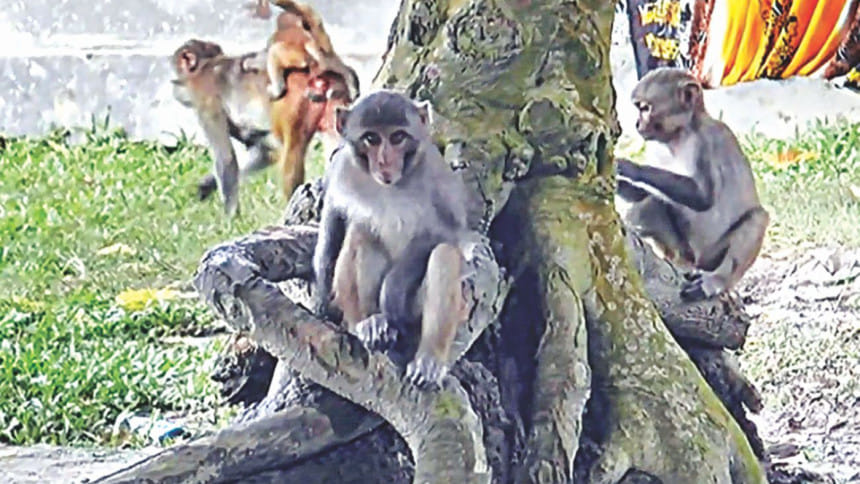Nature Quest: Madaripur monkeys vanishing

In the 1950s there were as many as 50,000 rhesus macaques that called Madaripur town home. The rhesus macaque is one of the most common old world monkeys, with a large distribution range stretching from Afghanistan to Vietnam. But while numbers of the macaques remain healthy in general, the population in Madaripur town has faced serious decline. In decades to come it may just be that rhesus macaques in Madaripur are not more than a fond memory.
"The monkeys used to be plentiful in Charmugria Bondor, Kulpodmi and Puraton Bazar areas of the municipality," says Dipok Ranjon Saha, an assistant forest conservator at the local forest department office. "In the past the Hindu community provided a lot of food for the monkeys due to the animal's significance in their religion. But the Hindu population in Madaripur is not what it was; and at the same time areas of jungle suitable for the monkey have been cleared."
Moreover, the forest department budget dedicated to looking after the monkeys has dwindled. According to the local office of the department, Tk 12 lakh was allocated to support the monkeys in fiscal year 2006-07, but by 2016-17 the budgeted amount had reduced to Tk 3 lakh. In the current budget there is no allocation at all.
"We used to provide food for the monkeys under the auspices of the Bangladesh Biodiversity Project," says forest officer Md Enamul Haque Bhua, "but that project has ended. We have already submitted a new project proposal along similar lines and if our higher authorities approve it, we shall once more give them food."
Dipok is hopeful. "Our higher authorities are aware of the problem," he says. "It is sure to be solved very soon." In the meantime the monkeys are left to fend for themselves.
The macaque population nowadays stands at about 2,000 animals. Those that remain face a food and shelter crisis. "Mostly the monkeys that are left to take shelter in the abandoned JTC and Adamji jute mill company storehouses," Dipok says, "as well as on roofs of schools and colleges and some neighbouring houses."
Local reaction to the animals is mixed. "Sometimes the monkeys attack homes for food," says one town-dweller. "They are known to snatch food from children and passersby, which creates panic."
"Monkeys are a part of nature," says Masud Sumon from Charmugria, "but now because they are suffering a food and shelter shortage they are sometimes aggressive."
"Monkeys are very important for our environment," says Ajoy Kundu from the same area. "The forest department should take steps to ensure they don't disappear altogether."
"It is time the authorities again provided food and shelter for the wellbeing of the monkeys," says an associate professor of geology and the environment from Syed Abul Hossain College in Kalkini. "If we do not work to protect them we will suffer significant environmental loss."


 For all latest news, follow The Daily Star's Google News channel.
For all latest news, follow The Daily Star's Google News channel. 



Comments